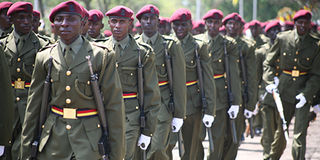Forces face off over merger proposal

General Service Unit recruits march during their graduation ceremony at the Embakasi GSU training ground on Friday. A proposal to merge the regular police and Administration Police has divided the two forces. Photo/HEZRON NJOROGE
What you need to know:
- As APs push to have status quo preserved, their regular comrades support the unity idea
Kenya’s policing agencies have differed sharply over a proposal to bring their operations under a unified command.
The Administration and regular police are this week scheduled to argue their cases before the team of professionals selected to jumpstart the long overdue police reforms.
Ahead of the sittings, the Nation can reveal, the Administration Police headed by Mr Kinuthia Mbugua, would be pushing to have the merger proposal rejected in favour of an even stronger AP force.
Speaking to the Nation, Mr Mbugua said: “I would never advice for a merger. How do you merge two different entities? The AP was created and has been sustained by successive governments.”
On the contrary, the regular police, which is headed by Maj-Gen Hussein Ali, thinks that the current dual policing system is an obstacle to accountability.
Retired judge Philip Ransley, who is the chairman of the National Task Force on Police Reforms, has invited both sides to submit their recommendations on the best way to transform policing in Kenya.
Maj-Gen Ali’s team further argues that if operations of the two are harmonised, discipline would be instilled.
In a bid to convince the taskforce to uphold the merger proposal, Maj-Gen Ali’s team will cite the Waki report as well as the Kenya Police Reforms Framework and the Kenya Police Service Strategic Plan. The latter two were authored by senior police officers in 2004.
Mr Mbugua said the reforms should empower the AP even more so that it is able to cope with emerging security challenges like human rights abuses, child abuse, human trafficking and terrorism.
He said the AP has already responded to the new security threats by forming the Rapid Deployment Unit (RDU) and the Rural Border Patrol Unit, which should be provided with special equipment.
“As a department, we have already drafted a Bill, which recommends changes to the 1958 Administration Police Act. It will be forwarded to the Attorney General,” Mr Mbugua said.
Police spokesman Eric Kiraithe told the Nation: “We shall front the two documents and reinforce them with more information.”
The reform roadmaps authored by senior officers in the regular force are yet to be implemented fully due to failure by the government to release Sh51.7 billion for implementation.
Hard-liners at Vigilance House and Harambee House, the Internal Security and Provincial Administration ministry headquarters, cannot escape blame for derailing reforms.
Besides the merger, the AP and regular police are light years apart on the issue of political interference on police duties.
Biggest obstacle
“On my part, I believe the department is working as independently as possible without any interference. We make decisions and get results as spelt out in our performance contracts. Our operations have remained within budgetary allocations,” said Mr Mbugua.
But a senior officer at Vigilance House, who requested anonymity because of the sensitivity of the matter, said that the “biggest obstacle to police reforms is politicians.”
Indeed, regular police will table before Justice Ransley’s team a proposal to have the police chief appointed under a security of tenure and be the chief accounting officer of the department.
If adopted, it would mean future police commissioners would only be fired after the President constitutes a tribunal to inquire into his or her conduct.
But according to Mr Mbugua, the status quo should be maintained on appointment of the AP commandant.
As it stands now, the minister for Internal Security is by law the AP commandant, and Mr Mbugua is the “deputy commandant.”
In one of the Internal Security ministry functions attended by the Nation, the ministry’s permanent secretary, Mr Francis Kimemia, said the AP had become the “police service of choice.”
Amid the contrast, however, the AP and regular police agree on changes that seek to improve the welfare of police officers.
Both teams want more money allocated for building new houses for officers, purchase of new and specialised equipment as well as increasing the number of personnel.
The Waki commission inquired into the role of security agencies in the post-election violence and recommended harmonising the two agencies.




